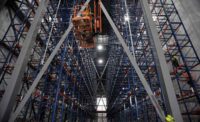
The market for major contractors has been growing slowly but steadily for the past few years. However, this has not resulted in contractors abandoning the lessons learned during the aftermath of the economic meltdown, in 2008. If anything, owner expectations that construction is still a bargain and the prospects of a growing worker shortage have left contractors continuing to search for ways to do more with less.
For ENR's Top 400 Contractors, 2014 was a pretty good year. As a group, the Top 400 generated $331.94 billion in contracting revenue in 2014, an increase of 2.4% from 2013's $324.16 billion. The figure is still below the record $338.38 billion in 2008 contracting revenue reported in our 2009 Top 400.
Domestic contracting revenue accounted for the Top 400's overall increase this year, rising 7.8% in 2014, to $268.82 billion, while international contracting revenue fell 15.6%, to $63.12 billion. The international market saw major declines in projects in the minerals-and-mining, petroleum and power sectors.
Bechtel continued its dominance on the Top 400, ranking at No. 1 for the 17th consecutive year. However, low oil prices and a decline in the minerals-and-mining sector have had a significant impact on its markets. "We did see some big energy proposals that we hoped to be awarded in 2014 that have been pushed back to this year," says Brendan Bechtel, president and COO. He says no prospects have "evaporated," but schedules have become more measured.
That does not mean that work in oil and gas has dried up. On May 18, Bechtel received the notice to proceed on two trains of the $9-billion Corpus Christi Liquefaction project for Cheniere Energy in Texas. "This is the first greenfield export liquefaction facility in the U.S., rather than a conversion of an import facility," Bechtel says.
Bechtel also reorganized its business units at the end of 2014, consolidating its global power and infrastructure units, while assigning its nuclear-power division to its government group. "When talking to governments of developing countries, they generally ask how we could upgrade both their power and rail systems, so it made sense to combine the power and infrastructure units into a single entity," Bechtel says.
One major development in U.S. contracting was AECOM acquisition of URS Corp., San Francisco, which ranked at No. 17 on last year's Top 400, and of Hunt Construction Group, Scottsdale, Ariz., which ranked at No. 50 on last year's list. Combining the two with Tishman Construction, which AECOM acquired in 2010, has created a major new contracting presence.
The Tishman-Hunt team is particularly synergistic, says Dan McQuade, group president of AECOM building construction. "Hunt brings to Tishman experience in sports, health care and aviation, along with a national footprint. Tishman gives Hunt a new presence on the East Coast and in the international market and its experience in the commercial and multi-unit residential markets," he says, adding that there is "amazingly little overlap between the two companies."
Competition
While the markets in the U.S. are growing, many large contractors still are feeling competitive pressures. Client expectations that construction is still a bargain and competitors' tough bidding have many contractors shaking their heads. "The intense competition does not seem to be decreasing, even though the construction industry has started to rebound. There seems to be a lack of confidence in the strength of the recovery," says Kevin McCarthy, CEO of PC Construction.
While some contractors possess an improved backlog and have adjusted their pricing accordingly, others that have not been as successful are continuing to price the delivery of work below a sustainable level. "These outliers make it difficult to reestablish 'normal' in the marketplace," says Gordon Lansford, president and CEO, JE Dunn Construction.
Even in the big-ticket international marketplace, competition has been intense. "Competition is fierce, but that is the nature of construction," says Bechtel. He also says there are times when client expectations do not match realistic project execution. Bechtel says his biggest concern is facing "irrational actors" determined to maintain volume at any cost. "We haven't seen a race to the bottom yet," he observes, but, if the energy market continues to be soft, he fears there may be an increase in unsupportable bids.






